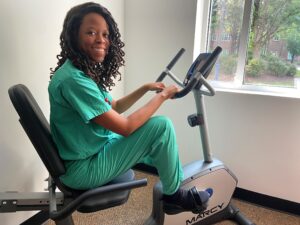By Lisa Farr, M.Ed. Director, Exercise Physiology Core Lab

Interview with Christine Ibilibor, MD, M.SC
Bladder cancer is the fourth most common cancer in men; it is less common in women. It mainly occurs in people over the age of 55, and the average age people are diagnosed is 73. About half of bladder cancers are diagnosed early, about 1 in 3 are diagnosed when the cancer has spread into the deeper layers of the bladder, and in the remaining cases the cancer has spread to nearby tissues, lymph nodes, or other areas of the body. The treatment for bladder cancer depends on the stage at diagnosis, but frequently includes both chemotherapy and surgery. If the cancer invades the bladder muscle, or doesn’t invade the muscle but does not respond to intravesical agents, a radical cystectomy is needed. This is considered major surgery, and like any major surgery, has risks and side effects. Sometimes patients get re-hospitalized due to pulmonary infections like pneumonia, or poor wound healing. Urinary tract infections are common.
Patients undergoing surgery for advanced bladder cancer tend to be older and have several co-morbidities that increase the risk for post-operative complications.
If patients are older and less healthy when they have surgery, it stands to reason that they may not do as well. This has been well-studied in other areas of medicine, such as cardiovascular disease and orthopedics. These studies led to a concept called “pre-hab,” which basically means trying to get patients as healthy as possible before surgery. In time sensitive cases, delaying surgery for weeks may not be feasible, but if it is, the time devoted to exercise therapy, nutrition, social support, anxiety-reduction, and improving well-being results in better outcomes for the patient.
UVA has several studies right now looking at the concept of pre-hab before surgery or chemotherapy. The PRIMER trial (Pre-habilitation with Mindfulness and Exercise for Patients Undergoing Radical Cystectomy ) is led by surgeon Christine Ibilibor. Her co-investigators are Tracey Krupski, MD, MPH; Alyssa Mixon, DO, MBA; Siddhartha Angadi, Ph.D; Ken Penberthy, Ph.D, and Bethany Horton, Ph.D.
Questions and Answers with Christine Ibilibor, MD, M.Sc
Question
What made you interested in studying exercise and mindfulness training in patients getting ready for bladder cancer surgery?
Answer
Surgery remains the gold standard treatment for the vast majority of high-risk bladder cancer patients. Having a big surgery is like running a marathon—can you imagine running a marathon without being in shape for it? Being fit for that marathon will help it go better. The same is true for major surgery. If patients come to the OR in good condition mentally and physically they are less likely to have complications.
As a surgery resident, I was bothered by the high mortality rate after major surgeries, as well as all of the complications that can happen and are more common in those who present for surgery in poor health. I wanted to make an impact on this.
For me personally, professionally, I believe that the key to good health is behavioral. We often turn to medications and surgeries but we would need those things less if we ate good healthy diets, exercised, and didn’t smoke. I believe in the power of lifestyle for prevention, as well as prevention of a cancer recurrence, and want to be a clinician who promotes it, who has these conversations with patients. Many patients do ask about it. They want to know what they can do, how they reduce their risk of cancer, risk of surgical complications, or of a cancer recurring.
Sometimes surgery has to happen pretty quickly and usually chemo happens before that, so these patients are dealing with a lot of medical appointments. But the message I want to get across is that even though exercise feels like one more thing they have to do, it is an important one, and one that actually makes them feel better. Most of our treatments do not make patients feel better, at least not in the short term. But exercise, meditation, eating well, not smoking—these things have both immediate and long term benefit.
Question
So what is the real-life application of your study?
Answer
We think patients who exercise and practice mindfulness training before surgery will feel better and do better. There are a lot of specific metrics we are interested in—Will patients function better after their surgeries? Maintain their cardiovascular fitness and muscle? Will they sleep better and worry less? Will their hospital stays be shorter? Will their wounds heal better? Can we reduce the chances of post-op pneumonia—a common reason patients are re-admitted?
Question
Can you walk us through what happens if a patient is eligible and interested in participating in the study?
Answer
Patients are sent to the surgical oncology clinic by either their local urologist or primary care physician. Often times they have already started chemotherapy, which is standard treatment for about 3 months prior to surgery. A surgery date is established and the study is explained to those who meet the eligibility criteria. Once a patient has heard about the study and has decided to participate, he/she will sign an informed consent, complete quality of life questionnaires and other surveys, and be scheduled for study-specific tests such as a cardiopulmonary exercise test (CPET) in the Exercise Physiology Core Lab. The CPET is performed on a recumbent bike. For this test the patient is hooked up to an EKG and metabolic mask and blood pressure is also monitored. The test starts out easy and progressively gets harder. The patient gives their best effort. The patient is then randomized to either a control group or an exercise/mindfulness group. Those in the exercise/mindfulness group will have a recumbent bike sent to their home (see photo), and will also be given an activity tracker to wear.

This bike is sent home with the study participants
The exercise program is based on the CPET. The maximal heart rate from the CPET guides the exercise program, and the patient will have some in person and virtual supervision to help make sure the exercise is safe and effective. Support during an exercise program, particularly for clinical populations like those with cancer, is very important.
In addition to exercise, patients will do a guided daily meditation practice. The goals of this aspect of the program are to reduce distress, anxiety, and worry, and improve wellbeing. These have been shown to impact patient-reported stress.
After a few weeks of exercise and mindfulness training, patients return for another CPET and to complete the quality of life surveys again. This will occur roughly a week before surgery. The hope is that function has improved or not gotten worse—despite the fact that the patient has been finishing up chemotherapy. Exercise has been shown to help with chemotherapy-elated side effects, such as fatigue. The patient has surgery, and then the CPET and surveys are repeated about 30 days after surgery. Any medical complications after surgery are also tracked.
Interested in knowing more or referring a patient?
The study is UVA HRS 210502 and Dr. Ibilibor’s contact info is CI5D@uvahealth.org.
While catching up with Dr. Ibilibor about her new study, we took the time to get a little personal too.
Question
Dr. Ibilibor, are you an exerciser?
Answer
Yes! I love hiking…Charlottesville is great for that! I swam in high school and have always done yoga. Sometimes when I am here in my office I take breaks by doing headstands or other yoga poses.
Question
What advice about exercise would you give your younger self?
Answer
Carve out time for exercise every day. Whatever loss of productivity you have for the 20 or 30 minutes you are exercising is worth it for the mental benefits. When I was a resident working tons of hours I didn’t exercise every day but I think I would have felt less stressed and had more energy if I had carved out this time.
Question
You’ve mentioned the importance of healthy eating a few times during this interview. Did you grow up eating healthy?
Answer
I did. I didn’t probably appreciate it as much at the time, but we were one of those families who never had soda in the house, who ate whole wheat pancakes. I was lucky—this set me up well. I think about this when I talk to patients sometimes and they have never eaten healthy and don’t really know how or where to start. That’s hard. As clinicians we need to teach people about a healthy diet and how important it is to stay active. Along with not smoking, these things are huge for our health.
Dr. Ibilibor practicing what she preaches!

